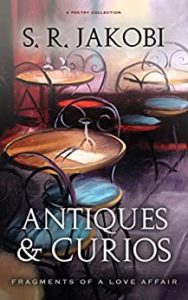It’s not exactly rare, but it is a bit unusual these days to find an entire poetry collection built around a single story. The last one I recall reading is The Long Take by Robin Robertson, some 20 months ago. That was a genre-bending work of fiction, poetry, and crime story that defied classification.
Antiques & Curios: Fragments of a Love Affair by S.R. Jakobi is clearly a poetry collection in the conventional sense, but its 96 poems center on one event: a love affair between an older man and a younger woman, work colleagues who almost accidentally stumble into and fall for each other. The poems tell a single, usually chronological story of the relationship—how it begins, develops, matures, deteriorates, and eventually ends. Except it doesn’t end, not really; it’s carried on in memory for decades.
The affair begins after a game of cricket, a chance conversation that both find charming. He helps her avoid a puddle, and imagines himself Sir Walter Raleigh, spreading his cape. It’s a dangerous comparison, one that leads directly to the affair.
Through the poems, we follow a “first time-around” with all of its urgency and passion. The relationship ends, but is renewed in a “second-time around,” less urgent but just as passionate, until it reaches an end that both recognize as the end. But an aftermath follows, because they both work in the same business and they can’t help but occasionally see each other. That’s all the aftermath is—the reigniting of a memory that is barely a flicker of what the reality had been.
In this poem, early in the relationship, the unease and insecurity are already beginning, a harbinger of what is to come.
Cinders

I wait at our office,
the summer quiet,
industry suspended,
in deep dormancy
I park myself,
unable to work,
tune in the radio,
bandwidth squander,
vacuity and time ill-used,
unrestrained nonsense
until melody,
familiar lyric,
tantalizing, hesitant
string sound,
note against note,
a funky bass guitar,
layered voices
cinders in my mouth,
I flee, an impulse for
urgency, take the
train to the city,
to find you
noisy crowds, jostle,
city active with life,
but not you
scanning, tired.
deep within me,
a cry,
frustrated sigh
Jakobi is a late arrival to writing poetry. A former university lecturer, he received degrees in business and languages, an M.A. in history, and a certificate in teaching. He has four poems included in an anthology, The Poets Symphony (2020), and is currently working on a sequel to Antiques & Curios and a collection of poems illustrated by his own photographs. He lives in England.
Antiques & Curios not only tells the story of a love affair, but also conveys a sense of loss without regret after the affair ends. It tells its story from the perspective of old age, looking back and understanding what happened. And it illustrates how an affair in the past can continue to shape one’s understanding of the present.
Related:
S.R. Jakobi interviewed at The Wombwell Rainbow
Photo by Nan-Cheng Tsai, Creative Commons, via Flickr. Post by Glynn Young.
__________________________

“I require all our incoming poetry students—in the MFA I direct—to buy and read this book.”
—Jeanetta Calhoun Mish
- Poets and Fables: Steven Flint and “The Sun and the Boy” - July 3, 2025
- Poets and Poems: Alison Blevins and “Where Will We Live if the House Burns Down?” - July 1, 2025
- Poets and Poems: Paul Pastor and “The Locust Years” - June 26, 2025

Maureen says
The short lines, spare words, and punctuation all lend that poem a staccato feeling, staccato also being a musical term. That the poet names it “Cinders” also speaks to what he knows will not last.
I wonder, does the form of the poems change, or the words or tone, etc., vary as the poems progress?
steve says
Hi Maureen
There is a music theme rippling within the collection. Changes in tone from loving to despair, and all points in-between, quite a bit of the latter as the collection progresses.
The staccato rhythm echoes the sense of urgency of action. And also the train journey clickety-clack. “Cinders” – the song is Ashes to Ashes – and nearly 30 years later my mind plays out those few minutes of decision making to its tune.
Thank you for your comments – they are very much appreciated.
Best wishes & keep well!!
Steve (s r jakobi)
Glynn says
The poems are all free verse. They do vary in length, some shorter and some longer. But all are generally on the shorter side.
steve reizlein says
Hi Glynn
Thank you for your perceptive and very kind review of my poetry collection.
Cheers & Keep Well!!
Steve